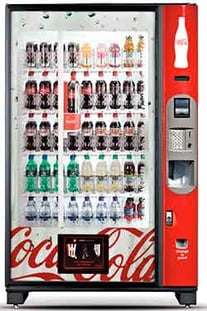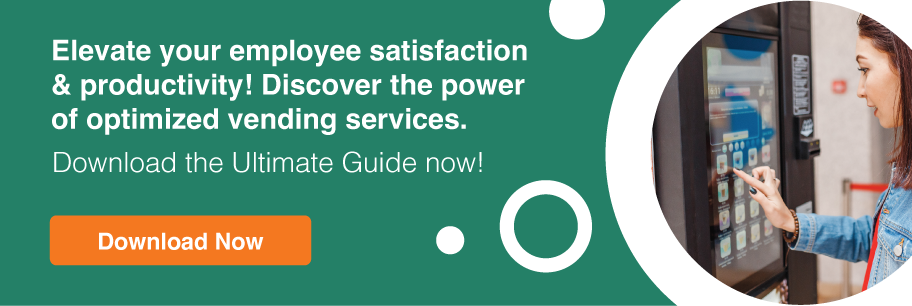
For a long time, vending machines were just about the only way to provide snacks and beverages for employees. But times have changed, and employers are putting more effort into developing break rooms that offer more than a stiff metal chair and the rattling of the air conditioner in the ceiling. Micro-markets and pantries have become increasingly popular as they help increase efficiency and convenience for employees. But which option is best for you?
Below are the pros and cons of each service, but let's first discuss what exactly they are.
Vending Machines

Vending machines have a long history, but they can be a quick and easy way to provide staff and customers with snacks and beverages.
Micro-Markets & Pantries
A micro-market is a modern, unattended retail concept that functions as a self-service mini convenience store within a workplace or community space. Unlike traditional vending machines, micro-markets offer a broader range of products, including fresh food, snacks, and beverages, all displayed on open shelves and in coolers. Customers can browse the selections at their leisure and then check out their items at an electronic kiosk, similar to those found in grocery stores.
Micro-markets have rapidly gained popularity due to the convenience they offer both employees and the suppliers who manage them. For employees, the variety and accessibility of products make it easy to grab a quick meal or snack without leaving the workplace. For suppliers, the unattended nature of micro-markets reduces the need for on-site personnel, making them an efficient and scalable solution for larger workplaces.
This blend of convenience, variety, and ease of management has made micro-markets an attractive option for companies looking to enhance their breakroom services and offer employees a more personalized and flexible refreshment experience.
A Pantry service otherwise known as snack delivery service, is a refreshment solution that shares similarities with micro-markets but operates with some distinct differences. While a micro-market is a self-service option where employees pay for their selected items at a kiosk or checkout station, a pantry service typically provides a stocked breakroom where snacks and drinks are available as a perk for employees, often at no direct cost to them.
In this setup, the employer covers the cost of the items, and the breakroom is regularly replenished with a variety of snacks, beverages, and sometimes even meals. The pantry acts as an all-inclusive, convenient option that enhances employee satisfaction and well-being by offering easy access to refreshments throughout the workday.
There are Variations within Pantry Services:
- Self-Service Pantries: Similar to micro-markets, but without the need for employees to pay individually. Instead, the company absorbs the cost as part of its employee benefits package.
- Hotel-style pantries: These might resemble the pantries found in hotels, where items are selected by employees but paid for at a central location, such as a front desk or a designated checkout area within the company premises.
By providing a well-stocked pantry, companies can foster a positive workplace culture, boost morale, and even improve productivity by ensuring that employees have quick and easy access to food and beverages without leaving the office. This service is particularly attractive in environments where time efficiency and employee perks are highly valued.
The Pros & Cons of Vending Machines, Micro-Markets, and Pantry Services
When deciding which refreshment solution is best for your workplace, understanding the pros and cons of each option is crucial. Here’s an expanded and clarified comparison to help you determine the right fit for your needs:
Managed Vending Machine Service
Vending Machine Pros:
• Cost-Effective: With full-service vending, the vending company typically handles the installation, stocking, and maintenance of the machines at no cost to your business. This makes vending machines a budget-friendly option, especially for companies looking to provide refreshments without upfront expenses.
• Quick Installation: Vending machines can be set up relatively quickly, usually within 2-3 weeks. This allows for a swift implementation of refreshment services, ensuring minimal disruption to your operations.
• Space-Efficient: Vending machines have a small footprint, making them ideal for workplaces with limited space. Their compact size provides flexibility in where they can be placed, whether it’s in a breakroom, lobby, or other common areas.
Vending Machine Cons:
• Potential Service Issues: While generally reliable, vending machines can occasionally experience issues such as malfunctioning payment systems, incorrect product dispensing, or stock outages. These issues can cause frustration for employees and require timely service calls to resolve.
• Limited Product Variety: Vending machines have a finite capacity and are limited to products that can fit within specific packaging sizes. This restricts the variety of items available, which might not fully satisfy the diverse preferences of your employees.
Micro-Market & Pantry Services
Micro-Market and Pantry Pros:
- Enhanced Convenience: Micro-markets and pantry services allow employees to easily grab the items they want directly from the shelves, creating a seamless and enjoyable experience. This convenience encourages healthier snacking habits and can improve employee satisfaction.
- Greater Product Variety: Unlike vending machines, micro-markets and pantries can accommodate a much wider range of products, including fresh meals, healthy snacks, and specialty items. This variety can cater to diverse tastes and dietary preferences, promoting a more inclusive workplace environment.
- Aesthetic Appeal: Micro-markets and pantry services often feature attractive shelving, sleek countertops, and well-organized displays that enhance the overall look and feel of the breakroom. This can contribute to a more pleasant and inviting workplace atmosphere.
Micro-Market and Pantry Cons:
- Higher Initial Costs: Setting up a micro-market or pantry service requires an initial investment to install shelving, counters, and other necessary infrastructure. Additionally, maintaining a stocked pantry service typically involves ongoing costs that must be budgeted for.
- Space Requirements: While micro-markets and pantries don’t need to be large, they do require more space than a typical vending machine. It’s important to have enough room to accommodate the hardware and allow employees to comfortably navigate the area.
- Risk of Theft: One of the challenges with micro-markets, in particular, is the potential for theft, as they operate on an honor system where employees are expected to pay for what they take. While suppliers implement measures to minimize shrinkage, it remains a concern that businesses need to consider.
Choosing the Right Managed Vending Option for Your Business
Deciding between vending machines, micro-markets, and pantry services ultimately depends on your workplace’s size, budget, and specific needs. For businesses with 40 or more employees, vending machines and micro-markets are viable options, offering convenience and variety. However, if your workforce is smaller or if space is limited, a well-stocked vending machine or even an office snack delivery service might be the better choice.
Understanding these pros and cons can help you make an informed decision that enhances employee satisfaction and aligns with your company’s goals. Whether you prioritize cost-effectiveness, variety, or convenience, there’s a refreshment solution that can meet your needs and create a positive impact on your workplace. For smaller operations, office snack delivery services can be a good option.
Frequently Asked Questions About Vending Machines
What are the main differences between vending machines and micro-markets?
Vending machines are compact, automated units that dispense snacks and beverages, typically with limited product variety. Micro-markets are self-service mini convenience stores with open shelves and coolers offering a broader range of products, including fresh food, and use electronic kiosks for checkout.
What is a pantry service and how does it differ from micro-markets?
A pantry service is a stocked breakroom where snacks and drinks are provided as a perk, often at no direct cost to employees, with the employer covering expenses. Unlike micro-markets, pantry services usually do not require employees to pay individually and can include self-service or hotel-style setups.
What are the advantages of using vending machines in the workplace?
Vending machines are cost-effective since the vending company handles installation, stocking, and maintenance at no cost to the business. They are quick to install, usually within 2-3 weeks, and space-efficient, making them suitable for workplaces with limited room.
What are some common drawbacks of vending machines?
Vending machines can experience service issues like malfunctioning payment systems or stock outages, which may frustrate employees. They also have limited product variety due to size constraints, which might not meet all employee preferences.
What benefits do micro-markets and pantry services offer over vending machines?
Micro-markets and pantry services provide enhanced convenience, greater product variety including fresh meals and healthy snacks, and an attractive breakroom aesthetic. They encourage healthier snacking and improve employee satisfaction with a more personalized refreshment experience.
What are the challenges associated with micro-markets and pantry services?
These options require higher initial setup costs and more space than vending machines. Micro-markets also face risks of theft due to their honor system payment method, which businesses need to manage carefully.
How should a business decide between vending machines, micro-markets, and pantry services?
The choice depends on factors like workplace size, budget, and space availability. Vending machines and micro-markets suit businesses with 40 or more employees, while smaller workplaces might prefer vending machines or office snack delivery services for convenience and cost-effectiveness.


